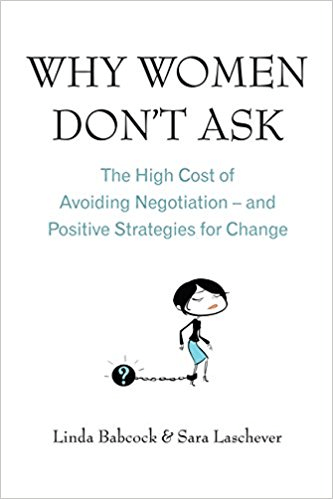According to the World Economic Forum’s Global Gender Gap Report 2017, the gender gap widened slightly in 2017 after a decade of progress. The (global) average pay for women in 2017 was $12,000, compared with $21,000 for men. It seems politicians, managers and thought leaders all pay lip service to the goal of curbing the gender pay gap. Activists (both men and women) have come up with a trove of policy ideas to achieve more equality. And yet the gap remains stubbornly high no matter what.

Though equal-pay legislation has never succeeded in eliminating the gender pay gap, some countries have decided to legislate further, or differently. In the USA, several states and cities have recently banned employers from asking candidates about their salary history, hoping to ensure that low pay doesn’t follow women from job to job and accumulate over time. And Iceland has just become the first country to make it outright illegal to pay women and men differently: since the first of January 2018, a new law requires that public and private companies pay employees equally “regardless of gender, ethnicity, sexuality or nationality”. Companies with 25 or more employees must provide certification and prove that they offer equal pay for work of equal value.
Political will and better rules may have a positive impact. After all Iceland has actually managed to rank number one in the world for gender equality, according to the World Economic Forum’s ranking of nations with the smallest gender gap. But many experts are actually dubious about the efficacy of further laws. It seems that gender inequality can not be attributed to wilful discrimination and different treatment alone. Indeed, in the absence of a clear and rigid pay grid for clear and rigidly defined positions (often in the public sector), pay is more often the result of employee demand and negotiation. And when it comes to pay raises, promotions, benefits or other advantages, women just don’t ask.
A short decade ago, Linda Babcock and Sara Laschever published Why Women Don’t Ask: The High Cost of Avoiding Negotiation — and Positive Strategies for Change. Their analysis and propositions are more relevant than ever. “Women don’t ask. They don’t ask for raises and promotions and better job opportunities. They don’t ask for recognition for the good work they do. They don’t ask for more help at home. In other words, women are much less likely than men to use negotiation to get what they want”. So what if women learned to ask.
Women just don’t ask and it’s slowing down the progress of gender equality
“Could it be that women don’t get more of the things they want in life in part because they don’t think to ask for them?”, ask the authors of Why Women Don’t Ask. Study after study has shown that men negotiated their salaries much more often than women did. One such study mentioned in the book, conducted among Carnegie Mellon graduates, showed that students who had negotiated were able to increase their starting salaries by 7.4% on average, which coincidentally matches the difference between men’s and women’s average starting pay. Few employers will pay more than they need to: they may be prepared to spend more to lure in the applicant they’re after, but will most often be very happy to pay less if they can.

The importance of starting salaries cannot be overstated as small initial differences will turn into large discrepancies over the years. Therefore the cumulative effects of the gender gap in asking can be massive. Your previous salary tends to determine how much you will be offered as it will be used as a benchmark. That’s why banning employers from asking about salary history has been debated so much in the USA. Several US states like California (starting January 2018), Massachusetts (starting July 2018) and Oregon (after January 2019) and also cities like New York City, Philadelphia and New Orleans have chosen to go forward with the ban. As written in this article in Business Insider:
“If there’s one thing job seekers hate, it’s the dreaded salary question: “How much did you make in your last job?” Interviewees just can’t win when it comes to this inquiry. Answer honestly, and you might get low-balled when it comes to your starting salary. Fudge your past earnings, and you risk getting caught in a lie and terminated.”
These laws will likely do some good because they will make it harder for employers to use the applicants’ salary histories against them. However they won’t eliminate the multiplier effect of initial salary differences. Indeed a person’s salary history also determines their sense of self worth, their perceived needs and lifestyle and how much they will ask for or accept in their next position.
Across generations, the tendency among women is to just accept what they are offered and not ask for more, whereas most men initiate negotiation more often (two to three times more often). Many reasons can be put forward, among which the fact that girls have been taught to value relationships more: “women worry more than men about the impact their actions will have on their relationships. This can prompt them to change their behaviour to protect personal connections”, Linda Babcock and Sara Laschever explain, citing several academic studies.
Because “opportunity doesn’t always knock
Another reason is that women tend to think of their circumstances as more fixed (less negotiable) than they actually are. “Women expect life to be fair, and despite often dramatic evidence to the contrary, many of them persist in believing that it will be”. Psychologists answer the question with the notion of “locus of control” which is the degree to which people believe that they have control over the outcome of events in their lives, as opposed to external forces beyond their control (see Wikipedia).
Individuals with an “internal locus of control” are those who believe their fate to be influenced by internal factors (effort, motivation…): they “make life happen”. Conversely, people with an “external locus of control’ are those who feel that “life happens to them”, that a multitude of external factors will determine the outcomes of their lives (market, weather, chance…). It turns out that, on average, women tend to have a more external locus of control. This can be accounted for by the fact that until recently women’s fates really were determined by external factors (they’ve only had the right to vote for less than 100 years in most Western countries): as psychiatrist Linda Austin wrote in her book What’s Holding You Back, “the lives of women have been largely controlled by men until quite recently”. For millennia “women’s collective identity rested on the acknowledgement that our lives were indeed controlled by external forces”.
With their more external locus of control, women assume they have little control over what they are paid. The most optimistic among them tend to believe that life is a meritocracy: by working hard, doing a good job and following the rules, you will find success and be offered advancement. Meanwhile, a majority of men have learned to be more aggressive about what they want, to advertise their achievements, sell their ideas or “hustle” their way to the top. As children, boys tend to be encouraged more than girls to challenge the status quo and make their own rules and are directed towards “unstructured” forms of play more often.
Low expectations have an impact on the outcome
There won’t be any negotiation if the parties are already satisfied with the status quo. You must be dissatisfied with what you have to want to ask for more. And women, the authors of Why Women Don’t Ask argue, are often satisfied with less. Many scholars believe that women may be satisfied with less because they expect a lot less. It all boils down to expectations: “since lower expectations are more likely to be filled than higher ones, the odds are better that these women will be satisfied with the rewards that life sends their way”.
Up until recently a lot of women devoted their time to unpaid labour (domestic chores, childcare…). Even today, most of the world’s unpaid labour is performed by women. A lot of the global value created by women is not recorded in the GDP! They are less used to thinking of their work in terms of its monetary value. In short, we all have a “historical predisposition against recognizing the economic value of what society deems to women’s work” (Babcock & Laschever).
As women take on more unpaid work (i.e. when they become mothers), their paid work suffers even more. There is a “bigger wage gap between mothers and childless women than between young men and women”. In other words, there is a kind of double penalty: not only do women perform more unpaid work, but the more they do, the less the rest of their work gets paid. As a result, women “suffer from a limited understanding of their market power”.
Having been trained to think that they will work “for love” rather than money, most women are reluctant to negotiate their pay. It is striking how jobs that are dominated by a female workforce (education, childcare, healthcare…) rely on the notion that workers are entirely devoted to their “mission” (the love of others) to the detriment of pay. Working “for love” is almost like a moral imperative and a lot of women wrongly assume that love and pay are mutually exclusive.

The notion that women work “for love” has naturally rubbed off on other sectors too as women’s sense of gratitude becomes another limiting factor. More of them are unsure of what they “deserve”, struggle with a low sense of personal entitlement. Last but not least, when they compare themselves to others, they tend to almost exclusively compare themselves to other women (who are typically underpaid).
What all this means for managers
Fairness as a principle doesn’t work if applied only in response to demand; it must be safeguarded and promoted even when its beneficiaries don’t realize what they are missing”, write Babcock and Laschever, thus highlighting how difficult a goal actual pay equality is in organisations. “Principles” will be ineffective even with well-intentioned managers, who must manage the demands and expectations of their workforce and tend to heed only those demands that are expressed. After all even the best of them are not mind readers! When they yield to the somewhat excessive demands of their “star” performers, they are quite grateful that not all their employees are so demanding. The least-demanding employees just happen to be mostly women…
Companies and managers are little concerned with “morals” and “principles” and more with “bottom line”, so why should they extend to every employee the advantages (monetary and otherwise) negotiated by the most demanding of them? How can that not be too costly for the company?
Well, not doing it could actually be costlier: “it is in the nature of human motivation that when people are not appropriately rewarded for their efforts and contributions, they cease to aim high”. Though it is difficult to measure precisely, workers’ turnover costs companies millions every year. Women who don’t ask and lose motivation for lack of reward tend to look elsewhere for reward. Often they will be more likely to consider an outside offer than to ask for a raise. The cost of de-motivation is all the more tricky to measure as it goes beyond the cost of recruiting and training new people but should also include the cost of declining productivity.
However, offering male and female talents the same doesn’t necessarily have to cost more. As Iris Bohnet insisted in her book What Works: Gender Equality By Design (see our article titled “How Behavioural Economics Can Help Improve Gender Equality”), pay transparency is a powerful tool. To make pay less unequal, one of the solutions is to make it less negotiable and more transparent for everyone.
Large-scale change is sometimes possible. Babcock and Laschever give the example of the firm Deloitte & Touche, which in the early 1990s only had 5% of female partners, but managed to increase that percentage significantly in the following two decades. The company found that most women left even before they could qualify for partners. At first they thought women left mostly to stop work altogether and have children, but no, women were leaving for other firms, citing D&T’s male-dominated culture as the big reason. They found huge differences in evaluations and pay. The reckoning prompted dramatic changes which benefited both men and women. It turns out both men and women wanted more freedom to balance work and family better. D&T stopped hemorrhaging talented people and saved millions of dollars in hiring and training. It all started with understanding the unconscious biases at work in the company’s processes and designing new ones to neutralise the biases.
Conclusion
It would be too simplistic a conclusion to just say that all women must do is to start asking for more. However negotiation classes and awareness raising have proved to have a huge impact: when expressly taught to ask, women do ask more often. When more aware that everything can be negotiated, they do tend to negotiate more. When told about the subtle psychological mechanisms at play, they do find ways to neutralise them. But of course, there are reasons for women’s propensity not to ask: cultural norms and unconscious biases will make it harder for them even when they do ask, which is why companies and society must aim at designing new processes for more gender equality.
The authors of Why Women Don’t Ask explain that women are not really “bad” negotiators, but have a fundamentally different approach to negotiating that involves caring more for inclusion, shared interests, and long-term goals: they shirk direct confrontations where negotiations are binary win-or-lose scenarios but embrace negotiations that are “grow-the-pie” scenarios where everybody can win. In male-dominated environments and confrontational cultures, that approach doesn’t work but it has proved far superior in more collaborative and inclusive environments.
Women’s approach to negotiation matches the current trend towards managerial change, open innovation, flatter organisations, and new more inclusive corporate models. Maybe women won’t need to learn to negotiate but rather will need to teach others to collaborate.
A lire aussi sur la dynamique humaine

Futur du travail : comment le télétravail bouscule les organisations
Zoom, Teams, Slack sont des outils qui font désormais partie de notre quotidien en télétravail. Avant une réunion ou un rendez-vous était (presque) inenvisageable si

Futur du travail : l’économie de l’isolement ou comment ré-entreprendre loin de l’entreprise
Cela n’aura échappé à personne que la crise sanitaire a fortement limité la mobilité des personnes, a éloigné les collaborateurs de l’enceinte de l’entreprise. Certaines

Le Knowledge Management peut se révéler un puissant vecteur d’amélioration de la performance des organisations
La vocation du Knowledge Management n’est plus simplement de référencer et de « mettre à l’abri » l’information clé, mais d’en faire le fer de

